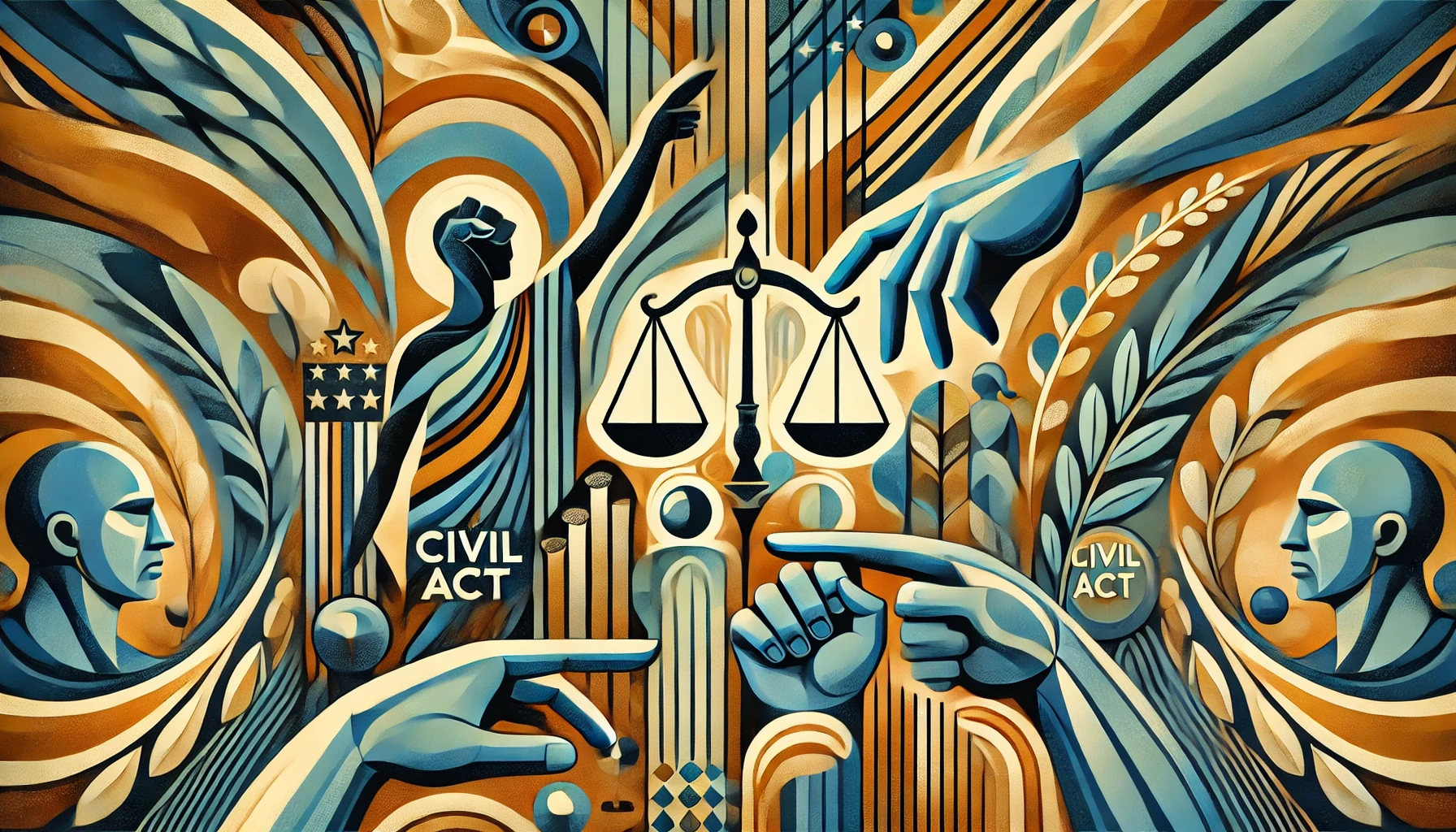
- This event has passed.
Civil Rights Act
July 2

The Civil Rights Act, enacted on July 2, 1964, is one of the most significant pieces of legislation in American history. It aimed to end segregation in public places and banned employment discrimination on the basis of race, color, religion, sex, or national origin. This landmark law was a crucial victory in the struggle for civil rights and served as a pivotal turning point for societal change in the United States. The Act was primarily a response to the widespread racial injustice and discrimination that African Americans faced across the country, particularly in the southern states.
The significance of the Civil Rights Act cannot be overstated. It not only transformed American society in terms of racial equality but also set a precedent for future laws intended to further the fight against discrimination. The Act’s passage came after years of intense civil rights activism, including protests, sit-ins, and marches that highlighted the need for change. These efforts were led by figures such as Martin Luther King Jr., whose leadership in the movement was instrumental in the enactment of the Act.
Historical Context and Passage
The road to the Civil Rights Act was fraught with challenges and resistance. During the early 1960s, America was deeply segregated, especially in the South. Public facilities, schools, and businesses were divided by race, and African Americans were often subjected to egregious acts of violence and discrimination. The civil rights movement, seeking to overturn these oppressive systems, gained momentum with acts of nonviolent protest and civil disobedience spearheaded by activists like Rosa Parks and organizations like the NAACP.
The actual passage of the Civil Rights Act involved a complex and heated legislative process. President John F. Kennedy initially proposed the Act in 1963, in response to numerous civil rights protests. After Kennedy’s assassination, President Lyndon B. Johnson took up the cause, recognizing the Act as a crucial part of his domestic agenda. The Act faced fierce opposition, particularly from Southern legislators who filibustered for 75 days, one of the longest in U.S. Senate history. Its eventual passage marked a significant legislative victory and a symbolic end to an era of overt racial segregation.
Key Provisions and Immediate Effects
The Civil Rights Act of 1964 was comprehensive in its scope. Title II of the Act prohibited discrimination in public places such as hotels, restaurants, and theaters. Title VII prohibited employment discrimination and also established the Equal Employment Opportunity Commission (EEOC) to help enforce federal job discrimination laws. Additionally, the Act provided for the integration of schools and public facilities.
Immediately after its enactment, the Civil Rights Act began to reshape American society. Public places gradually became accessible to all races, helping to dismantle the physical barriers of segregation. Although compliance was initially slow in some areas, especially in the deeply segregated South, federal enforcement mechanisms slowly began to change the racial landscape of America. The Act’s impact on employment and education sectors also started a transformation that would see a significant increase in opportunities for minorities in the decades that followed.
Long-Term Impact on Civil Rights
Over the decades, the Civil Rights Act has had a profound and lasting impact on civil rights in America. It laid the groundwork for subsequent laws, including the Voting Rights Act of 1965, which tackled racial discrimination in voting, and the Fair Housing Act of 1968, which aimed at eliminating discrimination in housing. The principles of equality and non-discrimination enshrined in the Civil Rights Act have also influenced countless state and local laws and have become a fundamental part of America’s legal and cultural fabric.
The Act also significantly influenced the global human rights movement, serving as a model for anti-discrimination laws worldwide. Its legacy can be seen in today’s ongoing struggles against inequality and injustice, proving that while progress has been made, the fight for civil rights is an ongoing effort that requires vigilance and continual advocacy.
The Civil Rights Act in Today’s Society
Today, the Civil Rights Act remains a critical reference point in discussions about equality and justice in America. Despite the progress it initiated, many believe that the fight for civil rights is far from over. Issues such as racial profiling, disparities in the criminal justice system, and ongoing discrimination in employment and housing still pose significant challenges. The Act serves as both a milestone and a reminder of the distances yet to be traveled in the quest for true equality.
Moreover, the current political and social climate has reignited debates about civil rights, with movements like Black Lives Matter and numerous social justice campaigns drawing parallels to the struggles of the 1960s. The Civil Rights Act thus continues to inspire new generations of activists and remains a foundational element in the pursuit of an equitable society.
Author’s Opinion
The Civil Rights Act of 1964 is undeniably one of the most transformative laws in American history. While it was a monumental step forward, the ongoing issues of racial and social inequality in the United States indicate that this Act was just the beginning of the journey towards true equality. As a society, we must continue to address the systemic inequalities that persist and strive to uphold the spirit of the Civil Rights Act in all aspects of public and private life.
10 Wishes Related to the Civil Rights Act
- May the spirit of the Civil Rights Act continue to inspire equality and justice across the nation.
- Wishing for a future where the principles of the Civil Rights Act are fully realized in every corner of society.
- Here’s to a society where the lessons learned from the Civil Rights Act guide our actions and laws.
- Wishing that the courage and determination of the 1960s civil rights activists continue to motivate us today.
- May the legacy of the Civil Rights Act propel us towards greater inclusivity and fairness.
- Wishing for continued progress in the fight against discrimination, inspired by the Civil Rights Act.
- Here’s to honoring the Civil Rights Act by advocating for equal rights for all, regardless of race, religion, or gender.
- Wishing that the enforcement of the Civil Rights Act remains strong and unequivocal.
- May we always remember the sacrifices made for the Civil Rights Act and continue the fight for justice.
- Wishing for robust educational efforts to teach future generations about the significance of the Civil Rights Act.
10 Unusual Facts about the Civil Rights Act
- The Civil Rights Act was originally proposed by President John F. Kennedy before being signed into law by President Lyndon B. Johnson.
- Title VIII of the Act, commonly known as the Fair Housing Act, was only passed in 1968, four years after the original legislation.
- The Act not only addressed racial discrimination but also marked the first major law to address gender discrimination in employment.
- The longest filibuster in U.S. Senate history occurred during the debate over the Civil Rights Act, lasting over 75 days.
- Some of the initial drafts of the Act included provisions that were ultimately removed, such as a ban on poll taxes, which was later addressed in the Voting Rights Act.
- The Civil Rights Act led to the creation of the Equal Employment Opportunity Commission (EEOC), which was initially considered a temporary measure.
- Before its passage, supporters of the Act organized a massive lobbying effort, including a “write-in” campaign to Congress with millions of letters.
- The Act has been amended several times to include more protections, including the Americans with Disabilities Act of 1990.
- Surprisingly, some Northern states were hesitant about the Act, fearing it would disrupt their own systems of racial separation.
- The signing of the Civil Rights Act was televised nationally, marking one of the first times a law was enacted on live TV.




